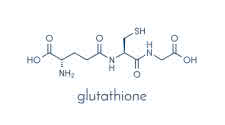The Benefits & Side-Effects of Glutathione Foods and Supplements

Whole foods are an excellent source of natural vitamins
Glutathione (pronounced Glute-a-thigh-own) - Is it an affliction of the buttocks? Hardly. Glutathione has nothing at all to do with your glutes,
but everything to do with your health. This strange-sounding substance is in fact a key antioxidant.
In our ever-constant battle against free radicals - those nasty microscopic critters that damage us daily at the cellular level (some scientists
estimate each cell in the body takes 10,000 hits a day from free-radical assault) - we are forever looking to consume more antioxidants in our
diet. So far so good, except for one thing.
One of the most vital and valuable antioxidants in existence, and one you should have in your arsenal, cannot be gotten from food - at least not
directly. Only the ingredients can be eaten. Your body then has to put the ingredients together to produce it. That it is glutathione.
Sounds like a paradox. If you can eat the ingredients then why can't you simply take a glutathione pill? The answer is HCL will stop you. HCL
stands for hydrochloric acid, otherwise known as stomach acid. Stomach acid breaks up the amino chains, which make glutathione, rendering it
useless.
That leaves two alternatives. Take it intra-venously or consume the ingredients and let your body construct this antioxidant weapon in the lower
gut out of reach from the stomach acids.
WHAT IT DOES?
First, let's take a closer look at glutathione and what it does. One of its prime jobs is it detoxifies. It is especially adept at eliminating hydrogen peroxide in the body. Peroxides form in the body when free radicals attack fat. The peroxides that result from the damaged lipids are not free radicals in and of themselves. However, when peroxides react with iron (and a few other substances), the hydroxyl radical is produced. Perhaps you've heard of it. The hydroxyl radical is the most dangerous, most unstoppable free radical of them all. Glutathione is the one antioxidant powerful enough to beat it.Glutathione is made from sulfur-containing amino acids. Such aminos are found in meat, fish, poultry, eggs and high-protein fruits and vegetables. Once in your body, the sulfur portion of the glutathione molecule attaches itself to various toxic substances in the liver and renders them harmless. After defusing the poisons, like a well-trained bomb squad, the multifunctional antioxidant then carries the toxic substance out of the body via the kidneys.
WHAT HAMPERS AND RESTORES IT?
You've probably heard that some drugs, such as alcohol and acetaminophen, can damage the liver if taken in excess. These drugs damage the liver by depleting the organ of glutathione, which leaves it vulnerable to toxins.Strenuous exercise uses up many nutrients, vitamins and minerals, which must be replaced between workouts. It also depletes the body of glutathione. Getting sufficient rest and the right foods are a critical part of your workout regimen.
Alpha lipoic acid recycles glutathione in the body. Taking it is important. The richest food source of alpha lipoic acid is found mainly in red meat. You can also take it in supplement form.
Selenium is another ingredient important to glutathione production, but try not to overdo this one - 200 meg is enough. Excessive dosages of selenium can result in hair loss and neurological symptoms.
Limit the amount of bad fats, such as trans and saturated fats, in your diet. Fighting this stuff uses glutathione.
Better to have your eggs with the yolk unbroken. Scrambling a yolk exposes its cholesterol content to the air, as a result it will become oxidized. Powdered eggs are another no-no. Nearly all commercially baked goods are loaded with trans-fatty acids and lipid peroxides.
Free radicals are produced as a byproduct of normal metabolic processes. Blasting away at your muscles on a frequent basis and for long periods in the gym can overload your body's ability to zap the free radicals.
To keep glutathione at its optimum level get sufficient rest, don't overtrain, eat the right foods and zap the free radicals before they can zap your cells. Take antioxidants, vitamins C and E, selenium, alpha lipoic acid and eat red meat, fish, poultry, eggs and high-protein plant foods to help your body fight back with the higher-caliber ammunition of glutathione.